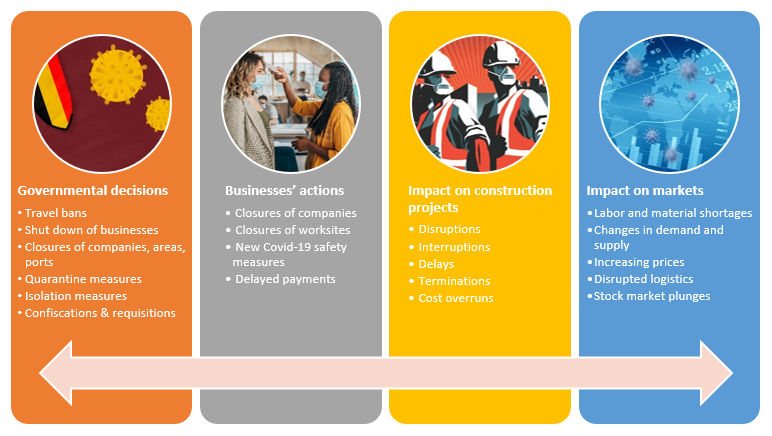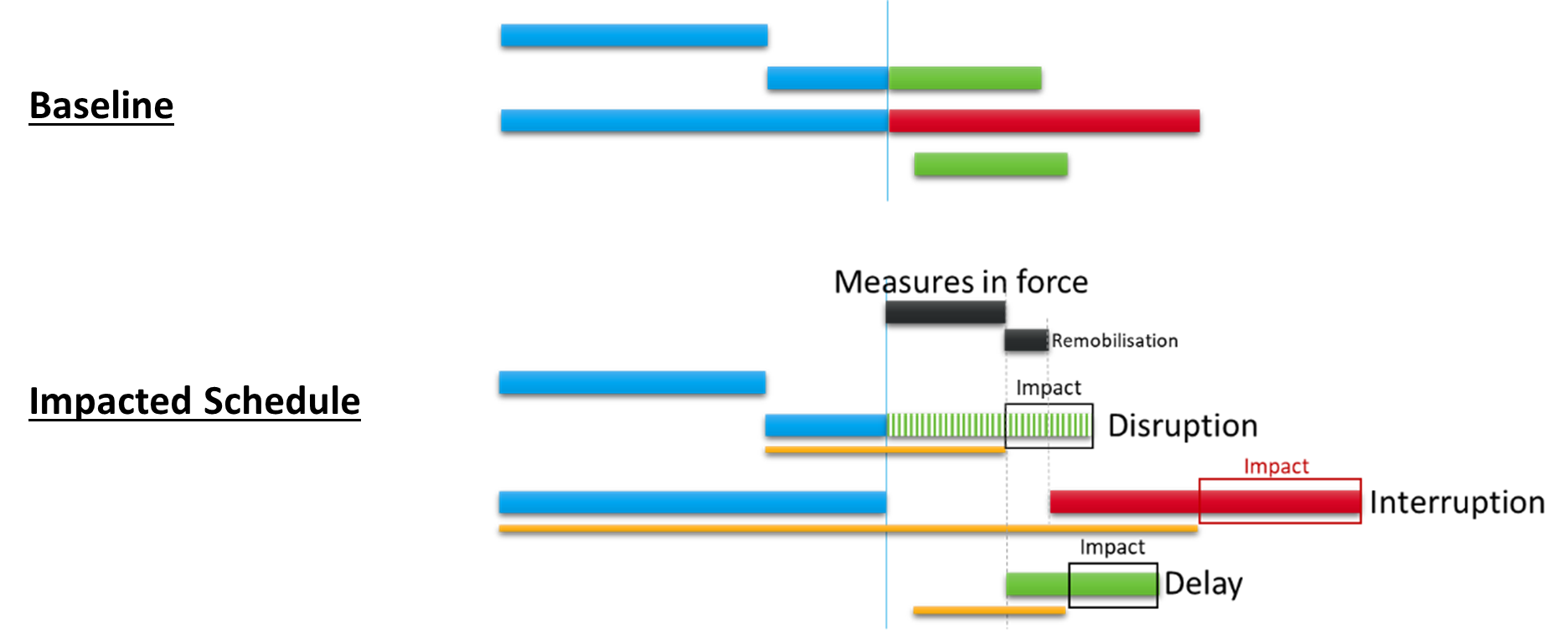
Covid-19 and construction claims: How to deal with pandemic related claims in 2022?


11 March 2020, the World Health Organization (WHO) declared the coronavirus (Covid-19) a pandemic. This created additional challenges for projects to stay within budget and on schedule. As a result, many of today’s claims and disputes originate in the hindrances caused by the pandemic. In 2020, the average value of construction industry disputes more than doubled in Europe with impacts due to Covid-19 named as number one reason for the increase (Arcadis, 2021).
Using Covid-19 as a reference, this blog post will advise project stakeholders on how to tackle pandemic related claims. This blog post will discuss the impacts of Covid-19 on the construction industry, the contractual clauses to be used, and the best practices on how to approach such claims.
Impact of the Corona crisis
Before diving into the contractual aspects, it is important to understand how the most recent pandemic (Covid-19) has affected the construction industry. Early 2020, the pandemic has forced governments and businesses to take multiple measures to limit the spread of the virus. Measures that ranged from company closures to travel bans and that eventually impacted projects directly by creating all types of disruptions and delays. Moreover, the markets became unstable and prices increased, making projects exceedingly difficult to complete within their planned budget. The figure below summarizes some of the numerous effects of the pandemic that directly and indirectly impacted the construction industry.

Contractual clauses related to Pandemics
For Covid-19, the restrictions changed constantly throughout the past 2 years, from strict lockdowns to soft safety measures as we adapted our lives to the virus. Hence, the contractual clauses used to approach Covid-19 also changed. At the beginning of the pandemic, contract managers addressed Covid-19 mainly under the force majeure clause. Now, the effects of the virus are more considered as a disturbance that is hindering construction activities which is more suitably addressed by disruption claims. While dealing with a pandemic claim, it is crucial to understand the impact the pandemic had on your project at the different instances.
Early 2020: Is Covid-19 a force majeure event?
FIDIC identifies the term "Force Majeure" as being an "exceptional" event or circumstance, beyond the party's control, and something that it could not have reasonably provided against before entering into the contract. In case of a force majeure clause in the contract, depending on the drafting, it may have different consequences like excusing the affected party from performing the contract; excusing that party from delay, entitling them to an extension of time; or even permitting them to terminate the project.
However, triggering a force majeure clause isn't that easy. The party seeking for it must prove that:
- Force Majeure has occurred (and that the event is a Force Majeure)
- Causation: Force Majeure has prevented, disrupted or delayed performance
- Mitigation measures were taken to mitigate or prevent consequences
Change in Law
An alternative to the force majeure clause is change in law. Enforced lockdowns preventing the performance of the works, travel bans and quarantine provisions may all be used to support pandemic related claims. Many contracts allow for relief for changes in law after the conclusion of the project, including an extension of time and relief for costs (“Covid to impact construction claims ‘until at least 2023’”).
Disruption claims
Disruption claims are used to recover additional costs incurred as a result of a disruptive event (an event that impacted the 'contractor's productivity that is outside of his control). Works can be disrupted but still be completed on time. In such instances, a contractor cannot claim for an extension of time but instead can claim for the cost of the reduced efficiency of its workforce and additional costs incurred (“Coronavirus: disruption claims in construction - Pinsent Masons”).
How to approach Covid-19 and pandemic related claims
The figure below summarizes best practices on how pandemic claims should be approached. In short, the contract should always be the starting point. All relevant clauses and claims mechanisms should be checked and abided by. With respect to the contract, the other party should be notified. The claiming party must maintain particularly good records on all events and their timings that have affected or interrupted the works. After that, argumentation should be built up on why and how is the party entitled for any extension of time or reimbursements of costs. Next, delay and quantum analysis should be done to assess the impact and present it in an accurate manner. Finally, the party must always try to mitigate the impact, risk and scenario analysis can always help.

Delay Analysis and forward-looking
It is crucial to be able to present how Covid-19 or any pandemic has impacted your schedule and/or how it will continue impacting your schedule. Different delay analysis methods exist that help in demonstrating the impact. A good delay analysis can play a significant role in ensuring an extension of time. The figure below shows a basic delay analysis using the 'project's baseline as a starting point.

Preparing effective construction claims
To be effective, a claim must have all the necessary information to allow the reviewer to make an informed conclusion. Also, a point often neglected is that claims must be analytical and not only descriptive. Hence, the process of claims preparation can be both frustrating and time-consuming. Recently, Proove and Afitac have joined forces. Our experienced consultants can now help you in both the contractual and analytical side of claims preparation.
References
Arcadis, 2021. 2021 Global Construction Disputes Report. [online] p.20. Available at: https://www.arcadis.com/ [Accessed 13 April 2022].
Coronavirus: disruption claims in construction - Pinsent Masons, https://www.pinsentmasons.com.
Covid to impact construction claims ‘until at least 2023’, https://www.pinsentmasons.com.




